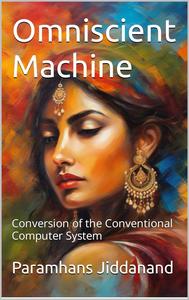Omniscient Machine

Free Download Omniscient Machine: Conversion of the Conventional Computer System
by Paramhans Jiddanand
English | April 6, 2024 | ASIN: B0CWS1RHVP | 364 pages | PDF | 118 Mb
Book Report on the Omniscient Machine
Project: "Omniscient Machine: Conversion of the Conventional Computer System by Paramhans Jiddanand"
Researcher: Paramhans Jiddanand. Founder: True Religion Mission. Location: India.
I. Introduction
– The book "Omniscient Machine: Conversion of the Conventional Computer System" explores the revolutionary concepts proposed by Paramhans Jiddanand, the founder of the True Religion Mission in India.
– Jiddanand’s work introduces a groundbreaking hypothesis on the potential transformation of conventional computer systems into an "omniscient machine" capable of unprecedented capabilities.
II. Summary of Key Topics
1. Limitations of Conventional Computer Systems
– Jiddanand critically examines the inherent limitations of existing computer architectures and their inability to fully harness the potential of information processing.
– He argues that current systems are constrained by their linear, deterministic, and binary-based foundations.
2. Theoretical Framework of the Omniscient Machine
– Jiddanand proposes a new conceptual framework for the "Omniscient Machine," which aims to transcend the limitations of conventional computer systems.
– This framework is rooted in the principles of quantum mechanics, non-linear dynamics, and the integration of spiritual and metaphysical concepts.
3. Core Characteristics of the Omniscient Machine
– Adaptability and Self-Organization: The Omniscient Machine is envisioned to possess the ability to adapt and self-organize its internal structure and functions.
– Quantum-Based Information Processing: The system would leverage quantum phenomena to achieve superior information processing capabilities.
– Consciousness and Intuitive Decision-Making: Jiddanand suggests that the Omniscient Machine would exhibit emergent properties akin to consciousness and intuitive decision-making.
4. Potential Applications and Societal Impact
– Jiddanand explores the potential applications of the Omniscient Machine in diverse fields, such as scientific research, technological innovation, and societal transformation.
– He also discusses the potential ethical and philosophical implications of such a technology, including concerns regarding consciousness, free will, and the relationship between humans and machines.
III. Evaluation and Critique
– Jiddanand’s work presents a bold and thought-provoking vision for the future of computing, challenging the conventional paradigms.
– The theoretical framework and proposed characteristics of the Omniscient Machine are ambitious and require further empirical and scientific validation.
– Concerns regarding the feasibility, scalability, and potential risks of such a technology will require careful consideration and ongoing discourse.
IV. Conclusion
– "Omniscient Machine" by Paramhans Jiddanand offers a compelling and speculative exploration of the future of computing. While the concepts presented are highly innovative, they also raise profound questions and considerations that warrant further research and debate within the scientific and technological communities.